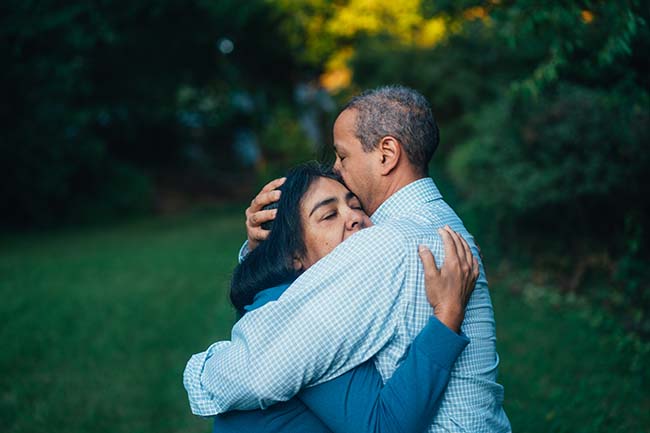Going to therapy can feel uncomfortable or even intrusive for many people. If you’re in a situation where you feel that couples therapy could be beneficial for your relationship, but your partner is resistant to the idea, it’s important to approach the conversation with care and understanding. Let’s break down some strategies for navigating this sensitive topic
How to talk to your partner about going to therapy
Acknowledging and Validating Their Feelings
The first step in this process is to recognize that your partner’s hesitation or discomfort around therapy is valid. Many people have reservations about seeking outside help for their relationship, and it’s crucial to approach these feelings with empathy and understanding.
Consider this example: imagine you have a friend who’s afraid of flying. You wouldn’t force them onto a plane or give them an ultimatum to confront their fear. Instead, you’d likely express understanding, offer support, and work together to find ways to cope with their anxiety. The same principle applies when discussing therapy with a reluctant partner.
It’s also important to consider that your partner may have underlying reasons for their resistance that you’re not fully aware of. Perhaps they grew up in a culture where seeking mental health support was stigmatized, or maybe they had a negative experience with therapy in the past. By acknowledging that their perspective is valid, you create a safe space for open and honest communication.
Expressing Your Own Perspective
Once you’ve validated your partner’s feelings, it’s time to share your own perspective on why you believe therapy could be beneficial for your relationship. This is an opportunity to express your thoughts and feelings without placing blame or making accusations.
For instance, instead of saying, “We need therapy because you never listen to me,” try framing it as a shared goal: “I’ve been thinking about how we can improve
our communication and grow closer as a couple. I believe therapy could give us tools to understand each other better.”
By using “I” statements and focusing on your own experiences and hopes for the relationship, you invite your partner to see therapy as a collaborative effort rather than a punishment or a sign that something is “wrong” with them.

Choosing a Therapist Together
If your partner expresses openness to the idea of therapy, one way to help them feel more comfortable is to involve them in the process of choosing a therapist. This can help alleviate some of the uncertainty and give them a sense of control over the situation.
You might start by discussing what qualities you both would like in a therapist. Do you have a preference for a male or female therapist? Is there a particular therapeutic approach or area of expertise that feels important to you? By identifying your shared priorities, you can work together to find a therapist who feels like a good fit for both of you.
Many therapists offer brief consultation calls, which can be a low-pressure way to get a sense of their communication style and approach. Consider scheduling a few of these calls together and debriefing afterwards to compare your impressions.
Throughout this process, it’s important to keep the lines of communication open and make sure your partner feels heard and respected. Phrases like, “I really appreciate you considering this with me” or “Your comfort is important to me in this process” can go a long way in reinforcing that you’re in this together.

Tips to keep in mind when talking to your partner about going to therapy
If, despite your best efforts, your partner remains resistant to the idea of therapy, it’s important to respect their decision. Pushing too hard or giving ultimatums is likely to backfire and create more tension in your relationship.
Instead, focus on what you can control: your own growth and well-being. Consider seeking individual therapy to work on your communication skills, emotional regulation, and self-awareness. As you start to make positive changes in your own patterns and reactions, it’s likely that your partner will take notice.
Remember, change takes time, and what feels impossible today may shift in the future. By planting the seed of therapy in a loving and respectful way, you’re opening the door for future conversations and growth.
In the meantime, continue to prioritize open, honest communication in your relationship. Look for opportunities to practice active listening, express your needs and feelings clearly, and work together to find compromises and solutions.
Share what you believe you both are struggling with:
- Perhaps it’s both of you having a hard time asking for help around the house.
- Maybe it’s both feeling that your sexual needs are not being met.
- Maybe its that you both try to communicate with one another, but end up in a bigger argument than before the conversation started.
Do not play the blame card here.
Additional Tips for the Conversation
Here are a few more strategies to keep in mind as you approach this sensitive conversation:
Emphasize your shared vision –
- Remind your partner of your shared hopes for the relationship. You might say something like, “I love you and I want us to have the kind of relationship where we both feel heard, respected, and deeply connected. I believe therapy could help us get there together.
Express your own desire to learn and grow
- Make it clear that you see therapy as an opportunity for personal growth, not just a means of changing your partner. You could say, “I know I have my own patterns and blind spots, and I’m excited to learn more about myself and how I can be a better partner to you.”
Frame it as a team effort
- Emphasize that you see your relationship challenges as something you and your partner face together, not as a battle between the two of you. “I believe we’re stronger together, and I’m committed to working through this as a team.”
Be patient
- Remember that the decision to seek therapy is a big one, and it may take time for your partner to come around to the idea. If they’re not ready to take that step right away, respect their timeline and continue to model openness and commitment to growth in your own behavior.

Additional Resources
If you’re not quite ready to broach the topic of therapy with your partner, or if you’re looking for additional support, there are many resources available:
- Books or workbooks on communication skills and relationship building (e.g., “Hold Me Tight” by Dr. Sue Johnson, “The Seven Principles for Making Marriage Work” by Dr. John Gottman)
- Support groups or forums for people in relationships struggling with similar issues
- Individual therapy to work on your own growth and self-awareness
Taking the Next Step
Remember, seeking support is a sign of strength, not weakness. By taking steps to invest in your relationship and your own well-being, you’re
setting a powerful example of self-love and commitment to growth.
At the end of the day, the decision to go
to therapy is a deeply personal one that requires buy-in from both partners. By approaching the conversation with empathy, openness, and respect, you’re laying the groundwork for a stronger, more resilient relationship – whether or not you end up in a therapist’s office together.
If you do decide to take the leap and give therapy a try, know that you’re embarking on a brave and transformative journey. With the right support and a willingness to work through discomfort, you and your partner have the power to create the kind of relationship you both deserve.
Remember that our clinicians at Modern Wellness Counseling can help you and your relationship by seeing you virtually for online counseling. You can call our office at (210) 706-0392 to schedule an appointment or visit our online booking system here.
By Priscilla Rodriguez, M.S., LMFT, Owner of Modern Wellness Counseling




